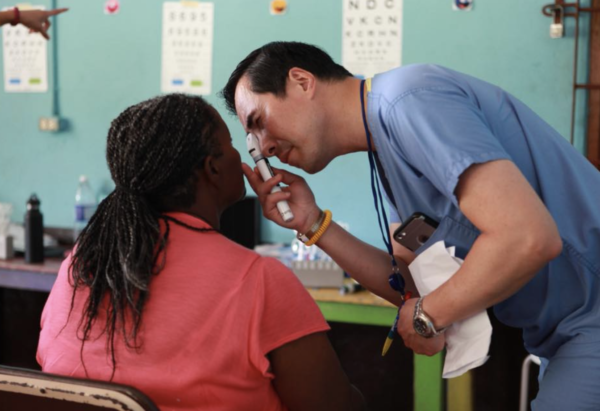By: Carly Duncan –
 Meet another member of our AOJAH team: Dr. Maxwell Cheng!
Meet another member of our AOJAH team: Dr. Maxwell Cheng!
1. How did you become involved with AOJAH?
I was having lunch with Joan and Gloria, the president and vice president of AOJAH, and they told me that they needed an eye doctor for the medical mission which was coming up in about a month. They asked if I would come, and I said I would because I enjoy doing missions in new countries. When I went to Jamaica, I was shocked not only by the lack of health care but also by the extremely high rate of glaucoma that I was diagnosing. I soon realized that if I did not return the next year, blindness among the patients with glaucoma would continue to progress without a yearly evaluation and treatment.
2. What is your role in the AOJAH team?
I serve as the Eye Team Leader. I recruit the optometrists, ophthalmologists, eye surgery team, and optometry students. In addition, I help obtain the glasses, medications, surgical instruments, and equipment needed for close to 1600 patients, which also includes eye surgeries for cataracts and glaucoma. The day after one mission ends, I’m already busy planning for the next mission because I need to start working on inventory lists and obtaining glasses, medications, and equipment.
3. What is your favorite part of being involved with the program?
I love being able to use the knowledge and abilities that I have to help others in such a meaningful way. We take health care for granted in the US, but in other countries where it is not readily available, the lack of health care has dentrimental effects not only on health but also one’s ability to get an education, to earn a living, to feed one’s family, and to live a fulfilling life. I also love the comradery working with the other wonderful humanitarians who volunteer on the missions. The doctors, nurses, pharmacists, health educators, students, and other volunteers all work as a team with the common purpose to improve the lives of those who are in such great need.
4. Can you please share one specific story or memory involving AOJAH that sticks out to you?
My first year in Jamaica, I remember diagnosing one man who was blind in both eyes from glaucoma. He had no idea why he had lost his vision and thought that glasses would help him. After him, I saw a middle-aged man who was already blind in his right eye from glaucoma, and right after that, another middle-aged man who was already blind in his left eye from glaucoma. In the US, we would normally not see three patients with undiagnosed advanced glaucoma in even one month for three reasons. First of all we have close to 24 times the number of optometrists per person in the US than there are in Jamaica, which means that there is one optometrist per 8,000 Americans while there is just one optometrist per 180,000 Jamaicans. So it would be highly unlikely to find an American who has never had an eye exam, whereas in Jamaica it would not be uncommon to find someone who had never had an eye exam. Second, medications and glasses are affordable for the vast majority of Americans, whereas in Jamaica the cost of glasses can equate to 2 months’ salary and glaucoma medications can equate to one year’s salary. Third, Jamaica has one of the world’s highest rates of glaucoma, but this has not been published in research before because of the lack of eye doctors on the island. Hopefully AOJAH can change this and make it known both locally and worldwide.
5. What keeps you coming back?
I feel compelled to return to Jamaica because I see the dire need for health care in the communities that we visit there. I know that we are helping to improve people’s vision and to prevent blindness. I see how appreciative people are to finally be able to get health care, an eye exam, glasses, and medications which they could not afford.
6. How has being involved with the organization changed you?
My experience with AOJAH has given me a special concern for Los Angeles’ homeless and the impoverished communities of Jamaica, both of which have little access to health care, doctors, medicines, and glasses. It also has given me great hope that we can work together to make a difference in the world and to make it a better place.
7. Is there anything else you would like people interested in AOJAH to know?
Every person can contribute in some way to a mission, whether it is in planning, fund raising, packing, organizing, volunteering overseas or locally, or donating. There is no small role in helping a mission because each piece that a person contributes makes the entire mission possible.
